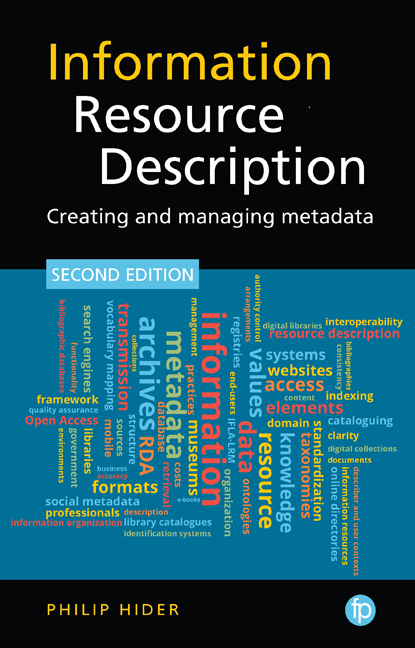Book contents
- Frontmatter
- Dedication
- Contents
- List of figures and tables
- Preface to the First Edition
- Preface to the Second Edition
- List of abbreviations
- 1 Definitions and scope
- 2 Information resource attributes
- 3 Tools and systems
- 4 Metadata sources
- 5 Metadata quality
- 6 Sharing metadata
- 7 Metadata standards
- 8 Vocabularies
- 9 The future of metadata
- Further reading
- List of metadata standards
- Index
- Frontmatter
- Dedication
- Contents
- List of figures and tables
- Preface to the First Edition
- Preface to the Second Edition
- List of abbreviations
- 1 Definitions and scope
- 2 Information resource attributes
- 3 Tools and systems
- 4 Metadata sources
- 5 Metadata quality
- 6 Sharing metadata
- 7 Metadata standards
- 8 Vocabularies
- 9 The future of metadata
- Further reading
- List of metadata standards
- Index
Summary
Introduction
The standardisation of metadata enables it to be used in different information retrieval systems, and thus in different institutions. The sharing of metadata offers several benefits to information agencies and other interested parties. Most importantly, it means that metadata has to be created only once, saving a great deal of time and expense. It likewise means that metadata creation can be centralised, and assigned to those most qualified to do it. In addition, quality may also be improved because of more people working with the same metadata: there is more chance of its being amended or enhanced.
Simply making metadata available to users is, of course, an act of sharing. However, this chapter focuses on the sharing of metadata amongst systems. In the online environment this entails the standardisation not only of the metadata itself, but also of its transmission. We shall discuss various transmission protocols, along with other standards, in Chapters 7 and 8. First, in this chapter, we shall look at some of the mechanisms and arrangements that enable systems to share metadata. These may involve a two-way exchange or a one-way transfer of resource descriptions. Both the benefit and the cost of quality metadata have spurred many information agencies into collaborative action, with some impressive results, as we shall see.
Library catalogue records
One of the most prevalent information retrieval systems prior to the arrival of computers was the library card catalogue. Librarians were quick to see the potential efficiency gains from having record cards copied and distributed for insertion into multiple catalogues. Not many libraries, however, were in a position to mass-produce their catalogue cards, and so distribution tended to be in one direction. The LC began its card distribution service in 1901 and has been a leading record supplier ever since (Yee, 2009). Other national libraries, such as the British Library (in the guise of the British National Bibliography), also came to assume a responsibility for providing catalogue copy to their library communities, while a few companies, such as H. W. Wilson in the USA, started supplying cards on a commercial basis. A small number of libraries sent copy to suppliers, such as LC, for editing and distribution.
- Type
- Chapter
- Information
- Information Resource DescriptionCreating and Managing Metadata, pp. 111 - 122Publisher: FacetPrint publication year: 2018



